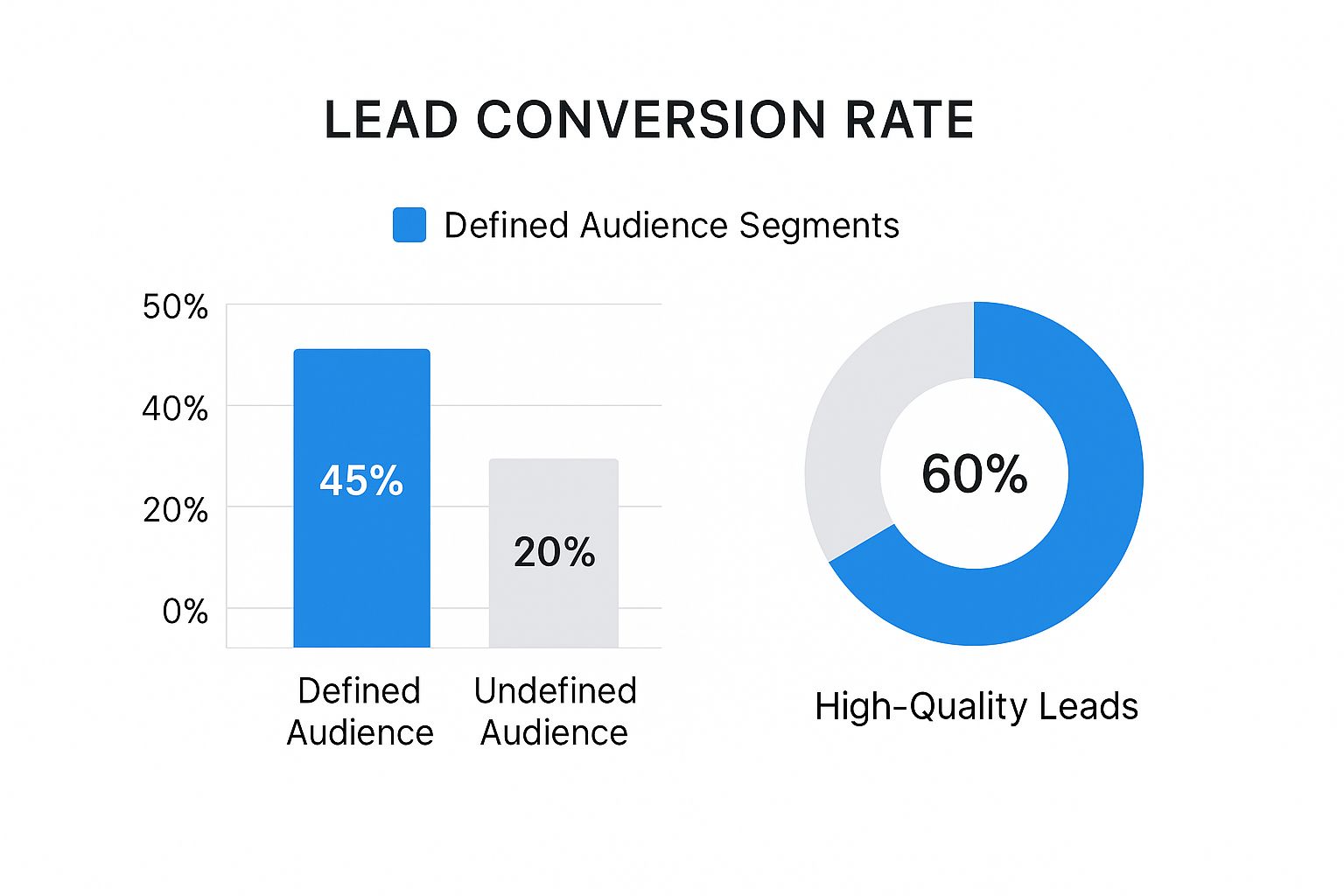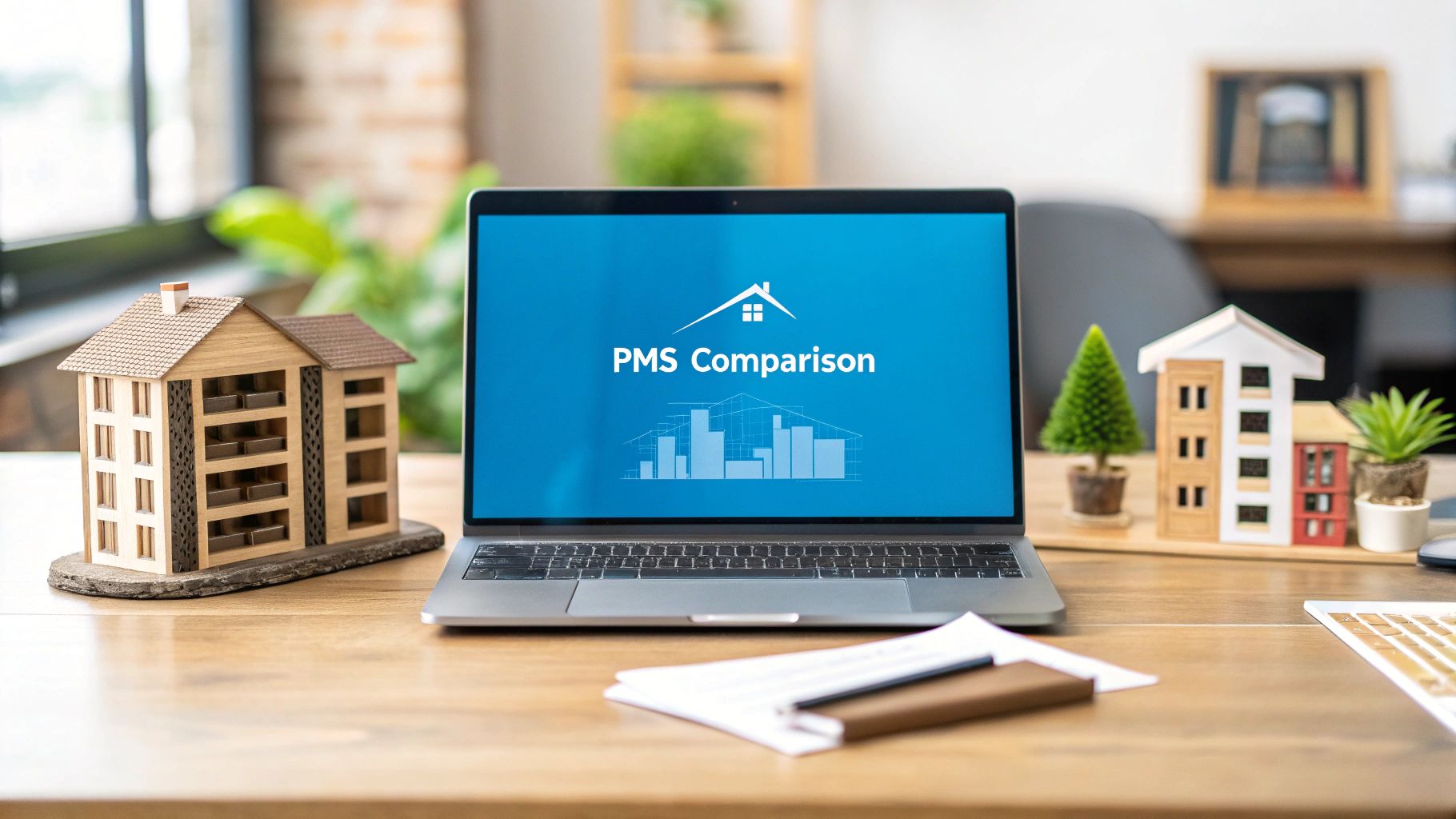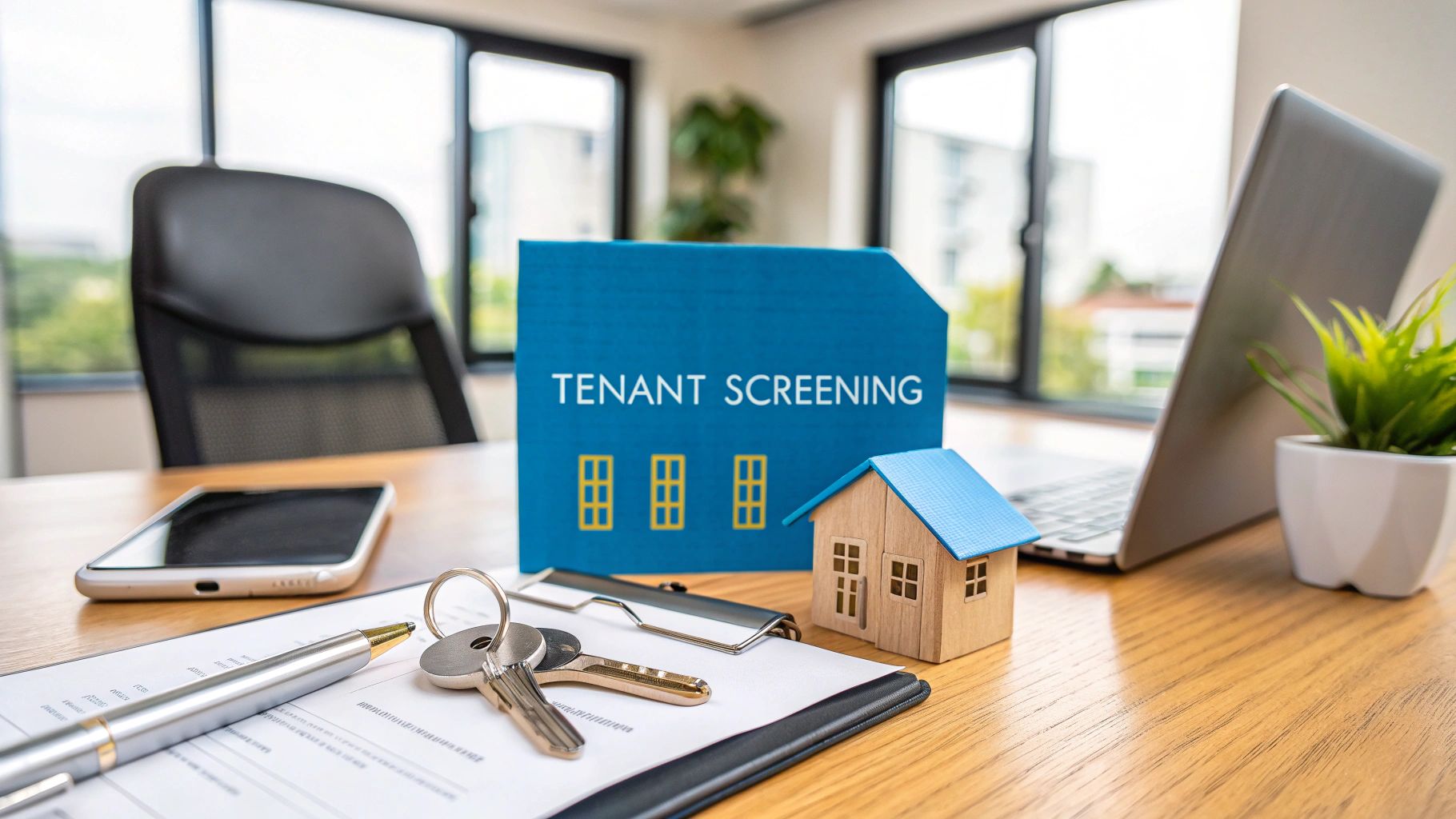The Evolving Landscape of Property Management Lead Generation

The property management industry is a fast-paced world. Client expectations are constantly changing, and the competition is fierce. Property managers need to adapt their lead generation strategies to keep up. Relying solely on traditional methods like word-of-mouth referrals, while still helpful, isn't enough anymore.
This shift demands a better understanding of the forces shaping the industry, and a willingness to try new things.
The growth of digital platforms has changed how property owners find and choose management services. Potential clients do a lot of online research before contacting a property manager. They look for demonstrated expertise, transparent pricing, and easy communication. Property management companies need a strong online presence and a great digital reputation.
The property management industry is also rapidly expanding. The U.S. market, for example, is predicted to be worth about $81.52 billion by 2025 and $98.88 billion by 2029, with a CAGR of 3.94%. This growing market offers both exciting opportunities and significant challenges for property managers looking to grow their client base. Learn more here.
Adapting to the Modern Property Owner
Today’s property owners are tech-savvy and want smooth digital experiences. They expect readily available information, easy online communication, and efficient processes. This means property management companies must invest in technology and automation.
Think about online shopping. Most people prefer the convenience of e-commerce. Similarly, property owners are drawn to management companies that offer streamlined digital solutions.
Key Strategies for Effective Lead Generation
Succeeding in this environment requires a diverse approach to property management lead generation. Consider these strategies:
Targeted Digital Marketing: Reach the right people using platforms like social media, search engine optimization (SEO), and paid advertising.
High-Value Content Creation: Create valuable content that addresses the specific needs and concerns of property owners, such as blog posts, guides, or webinars.
Strategic Partnerships: Work with related businesses, like real estate agents and contractors, to expand your network and generate referrals.
Leveraging Technology: Using tools like CRM systems and marketing automation software can simplify lead generation and nurturing processes.
Data-Driven Optimization: Regularly analyze your lead generation efforts and adjust your strategies based on how they're performing.
By using these strategies, property managers can not only survive but excel in the changing world of property management. While technology is vital, building real relationships with clients is still key. The future of property management lead generation is about finding the right mix of technological efficiency and personalized human interaction.
Digital Channels That Actually Deliver Property Management Leads

Not all digital marketing strategies yield the same results when it comes to property management lead generation. Some channels consistently outperform others, offering a better return on investment and delivering higher-quality leads. Understanding these nuances is essential for strategically allocating your marketing budget.
Content Marketing and SEO: The Foundation of Organic Growth
Content marketing, creating valuable, informative content for property owners, is a key driver of organic lead generation. This means crafting blog posts, articles, guides, and other resources that address the specific needs and pain points of your target audience. For instance, a blog post like "10 Tips for Attracting High-Quality Tenants" could resonate with landlords seeking expert advice. By consistently delivering helpful content, you position your company as a trusted authority.
Consistently providing high-quality content organically attracts potential clients. Search Engine Optimization (SEO) works in tandem with content marketing. Optimizing your website and content for relevant keywords, such as "property management services," increases your visibility in search engine results like Google. This drives more organic traffic to your website, connecting you with an audience actively searching for property management solutions.
Social Media: Engaging Your Target Audience
Social media provides an invaluable opportunity to connect with potential clients directly. Platforms like Facebook, LinkedIn, and Instagram can be used to share content, engage followers, and execute targeted ad campaigns. Sharing client testimonials, highlighting property management success stories, and offering market insights builds brand authority.
This fosters trust and credibility, ultimately generating high-quality leads. Sharing valuable insights into the local rental market can solidify your reputation as an industry expert. Building a strong social media presence takes time and effort, but the payoff in terms of lead generation can be significant.
Paid Advertising: Accelerating Lead Generation
Organic strategies are crucial for long-term growth, but paid advertising can deliver a rapid boost to lead generation. Platforms like Google Ads and social media advertising enable you to target specific demographics and interests. This precision targeting can dramatically increase your lead generation efficiency, especially for new service launches.
However, managing paid campaigns requires strategic planning and careful monitoring to maximize ROI. It's important to track key metrics, like cost per lead and conversion rate, to optimize your campaigns for maximum effectiveness. Paid advertising allows you to reach a larger audience quickly and efficiently.
Balancing Organic and Paid Strategies
The key to success lies in finding the right balance between organic and paid strategies. Organic methods cultivate long-term brand authority and trust, while paid advertising generates a more immediate influx of leads. Integrating these approaches creates a sustainable lead generation engine. This comprehensive approach ensures consistent growth and maximizes your reach.
Channel Performance Comparison: Where to Focus Your Efforts
The following data chart visualizes the typical performance of various digital channels for property management lead generation, ranked according to a combined score based on lead volume, lead quality, and cost per lead.
(Infographic - Bar Chart to be inserted here)
- X-axis: Digital Channel (Content Marketing/SEO, Social Media, Paid Advertising, Email Marketing, Referral Programs)
- Y-axis: Lead Generation Effectiveness (Example Data: Content Marketing/SEO (75), Social Media (60), Paid Advertising (85), Email Marketing (70), Referral Programs (90)).
As illustrated in the data chart, Paid advertising delivers high lead volume, while referral programs generate the highest quality leads. Content marketing and SEO, although requiring more time, provide sustainable and cost-effective high-quality leads. This aligns with broader real estate trends, where lead generation is paramount. Real estate agents often allocate 10% to 20% of their annual budget to marketing and lead generation, highlighting the importance of client acquisition. More insights into real estate marketing trends can be found in this article about real estate marketing statistics. A diversified digital strategy is crucial for lasting success in property management lead generation.
Property Management Digital Marketing Channel Effectiveness
This table provides a snapshot of the effectiveness of different digital channels. While paid advertising can generate a high volume of leads quickly, referral programs often yield the most qualified leads, albeit at a potentially slower pace. Content marketing and SEO, while requiring consistent effort over time, provide a cost-effective avenue for attracting high-quality leads.
Creating Irresistible Lead Magnets Property Owners Actually Want

In today's competitive real estate market, generic lead magnets just won't cut it. Attracting property owners requires offering something truly valuable. This means understanding their motivations and tailoring resources to their specific needs. Effective property management lead generation hinges on this principle.
Understanding Property Owner Motivations
Property owners are driven by two main factors: maximizing returns and minimizing hassles. They seek a solid return on investment without the daily management headaches. Your lead magnets should address one or both of these core motivations. For instance, a guide on increasing rental income directly addresses the desire for higher returns.
Property owners also value informed decision-making. They appreciate data and insights that help navigate the complexities of the rental market. Offering resources like market reports or investment analyses can be highly effective. These resources position you as an expert and build trust with potential clients.
High-Converting Lead Magnet Examples
Here are some lead magnet examples that have proven successful in attracting property owners:
Interactive Rent Calculators: These tools empower owners to estimate potential rental income based on local market data. This makes your company a valuable resource in their decision-making process.
Market Insight Reports: Providing localized market trends, rental rates, and vacancy data demonstrates your expertise and provides actionable insights.
Property Management Checklists: A checklist outlining essential property management tasks, from tenant screening to maintenance, can be incredibly helpful for busy owners.
Case Studies: Sharing success stories and how you've helped other property owners achieve their goals builds credibility and trust.
Webinars or Online Workshops: Educational content on topics like maximizing rental income or minimizing vacancy rates can be very attractive.
Structuring Your Lead Capture Process
After creating your lead magnet, structure your lead capture process effectively. This involves clear call-to-actions and streamlined landing pages. A simple, user-friendly form allows property owners to easily exchange their information for your valuable resource.
Integrate this process seamlessly with your other marketing efforts. Promoting your lead magnet through targeted social media campaigns or relevant blog posts can significantly expand its reach and impact. Each touchpoint should reinforce your value proposition and encourage conversions.
Following Up for Long-Term Success
Effective lead generation doesn't end with the initial capture. A well-defined follow-up sequence is crucial for converting leads into clients. This might include automated email campaigns using platforms like Mailchimp, personalized follow-up calls, or invitations to exclusive webinars.
Nurture the relationship and demonstrate your expertise, positioning your company as the ideal property management solution. Providing continued value after capturing a lead builds trust and improves your chances of converting them into loyal clients. This ongoing process contributes to sustainable business growth.
Leveraging Technology To Transform Your Lead Generation Results
The property management industry is increasingly relying on technology to boost lead generation. Using the right tools effectively can be the difference between merely surviving and truly thriving in a competitive market. This section explores the key technologies driving successful lead generation in property management.
The Tech Stack Powering Modern Lead Generation
Today’s top-performing property management companies use a powerful combination of technologies to optimize their lead generation strategies. These include:
Property Management-Specific CRMs: A Customer Relationship Management (CRM) system designed specifically for property management is essential for organizing and tracking leads. HubSpot is a popular option that allows you to manage interactions, segment potential clients, and automate follow-up communications.
AI-Powered Lead Scoring: Artificial intelligence is changing how property managers identify high-potential prospects. Lead scoring algorithms analyze lead data to predict the likelihood of conversion, helping you prioritize your most promising leads.
Marketing Automation Tools: Automating repetitive tasks like email marketing, social media posting, and lead nurturing frees up your time. This lets you focus on building relationships and closing deals, improving efficiency and ensuring consistent communication. Mailchimp is a widely-used platform for email marketing automation.
Advanced Analytics Platforms: Understanding your lead generation data is crucial for ongoing improvement. Analytics dashboards offer insights into key metrics like conversion rates, cost per lead, and channel performance. This data empowers you to optimize your strategies for maximum impact. Google Analytics is a powerful tool for tracking website traffic and conversions.
Integrating Technology Into Your Workflow
Adopting new technology doesn’t have to be disruptive. Begin by identifying your main challenges and choosing tools that address those specific issues. For example, if you struggle to track leads, a property management CRM could be the best place to start.
Prioritize integration. Select tools that work smoothly with your existing systems, such as your property management software. This simplified approach minimizes disruption and ensures data consistency, maximizing the benefits of the technology. The global property management market is projected to reach $28 billion by 2028, with a CAGR of 7.5%. More detailed statistics can be found here. This growth highlights the increasing importance of effective lead generation.
Balancing Technology With The Human Touch
While technology is crucial for efficiency, remember that property management is a people-focused business. The best lead generation strategies balance technological automation with personalized human interaction. For instance, automated emails are useful for initial contact, but a personal follow-up phone call can build rapport and strengthen the relationship.
Practical Guidance For Different Adoption Stages
Whether you're just starting to explore technology or are ready for advanced solutions, there are tools to meet your needs.
Early Stage: Begin with the basics, like a CRM and simple email marketing tools.
Intermediate Stage: Consider marketing automation and basic lead scoring features.
Advanced Stage: Implement AI-powered solutions and advanced analytics platforms for comprehensive lead management.
By taking a strategic, phased approach, you can leverage technology to transform your lead generation results. This allows you to not only meet, but exceed market demands, positioning your company for long-term success. This translates to attracting high-quality leads, converting them into clients, and ultimately maximizing your business growth.
Content That Converts Property Owners Into Clients

Attracting property owners and converting them into loyal clients requires a strategic approach to content creation. It's not just about having a blog; it's about developing valuable resources that address their specific needs and demonstrate your expertise in property management. This means truly understanding your audience and providing them with valuable insights at every stage.
Identifying Key Content Formats
Different content formats appeal to different learning styles and preferences. A diverse content strategy is essential for reaching a wider audience and maximizing engagement. Consider incorporating these formats:
Blog Posts: Regularly publishing blog posts on relevant topics, like "Maximizing Rental Income" or "Tenant Screening Best Practices", attracts owners seeking expert advice. Blog posts are easily shareable on social media platforms like Facebook and can significantly boost your SEO.
Ebooks and Guides: Offering comprehensive guides, such as "The Ultimate Guide to Property Management," establishes you as an authority and provides a valuable resource for potential clients. These can serve as effective lead magnets.
Webinars and Online Workshops: Hosting webinars on topics like "Effective Property Maintenance Strategies" allows you to engage directly with potential clients and showcase your expertise in an interactive format. Platforms like Zoom make hosting webinars easy.
Case Studies: Sharing compelling case studies builds trust and credibility by demonstrating your successful track record. Real-world examples resonate with property owners looking for tangible results.
Infographics and Data Visualizations: Presenting complex market data through visually appealing infographics makes information easily digestible and shareable, particularly on social media platforms like Instagram. Tools like Canva can help you create professional infographics.
Addressing Property Owner Pain Points
Effective content directly addresses the challenges and concerns of property owners. Understanding these pain points allows you to position your services as the solution. Here are some common concerns:
Maximizing ROI: Property owners want to know how to increase rental income and minimize expenses. Content focused on revenue generation and cost optimization will resonate strongly.
Minimizing Vacancies: Reducing vacancy periods is a top priority. Content addressing effective marketing and tenant screening processes is highly valuable.
Efficient Tenant Management: Dealing with difficult tenants and legal compliance can be overwhelming. Content on tenant communication and legal best practices provides valuable support.
Property Maintenance and Repairs: Managing maintenance efficiently is crucial. Content offering tips for preventive maintenance and cost-effective repairs is highly practical.
Content Calendar and Repurposing
A structured content calendar ensures consistent output and helps align your content with your overall marketing goals. Planning ahead allows for strategic topic selection and targeted distribution.
Repurposing content maximizes its reach and impact. A webinar, for example, can be repurposed into a blog post, social media updates, or a downloadable guide, extending its lifespan and reaching different audience segments.
Measuring Content ROI
Analyzing content performance is essential for optimizing your strategy. Key metrics to track include:
Website Traffic and Engagement: Monitor website visits, bounce rates, and time spent on page to assess content effectiveness. Tools like Google Analytics can help you track these metrics.
Lead Generation: Measure the number of leads generated through each piece of content to identify what's resonating with potential clients.
Social Media Engagement: Track social shares, likes, and comments to understand content reach and audience response.
Conversion Rates: Analyze how many leads convert into paying clients after engaging with your content. This reveals which content pieces are most influential in the sales process.
To illustrate the performance of different content types, consider the following table:
Property Management Content Performance Metrics
This table provides a general overview. Actual results can vary depending on factors like topic relevance, target audience, and distribution channels. Analyzing your specific data is crucial for refining your content strategy and maximizing results. By consistently tracking these metrics, you can ensure your content is not only engaging but also effectively driving business growth.
Building Systematic Referral Engines That Deliver Consistently
Referrals are often the most valuable leads for property management companies. These leads arrive pre-qualified with inherent trust, resulting in higher conversion rates and stronger client relationships. However, many property managers rely on chance for referrals, overlooking the benefits of a structured program. Leading firms are transforming occasional word-of-mouth into reliable, systematic lead generation engines.
Incentivizing Current Clients for Referrals
Your current clients are your strongest advocates. Creating a formal referral program encourages them to actively recommend your services. A simple incentive, such as a discount on management fees for each successful referral, can be highly effective. For example, a 10% discount for a referral that signs a one-year contract can motivate clients. Clearly explain the program details and ensure participation is easy.
Building Strategic Partnerships
Look beyond your current client base. Partnerships with related businesses, such as real estate agents, contractors, and interior designers, can be a powerful source of referrals. These professionals regularly interact with property owners and can become valuable allies. A real estate agent, for instance, could refer a new property owner to your management services.
Positioning Your Company as a Local Authority
Establishing your company as a trusted community resource naturally attracts referrals. Hosting free webinars on relevant topics, such as "Maximizing Rental Income" or "Tenant Screening Best Practices," positions you as an expert and builds credibility. Active community involvement further enhances visibility and reputation. This recognition translates into organic referrals.
Tracking and Measuring Referral Sources
Understanding your referral sources is crucial for strategy optimization. Implement a tracking system, whether a dedicated field in your CRM or a simple spreadsheet. This data identifies the most effective referral channels. For example, tracking may reveal that real estate agent partnerships generate more qualified leads than online marketing.
Nurturing Key Relationships
Referral generation is about cultivating ongoing relationships. Regular communication with referral partners and clients, providing updates and valuable information, is key. This strengthens relationships and keeps your company top-of-mind. A personalized thank-you note to a referring client reinforces their recommendation's value.
Blending Traditional and Digital Strategies
Personal connections are the foundation of referrals, but digital tools can amplify your efforts. Share client testimonials and success stories on your website and social media platforms like LinkedIn. Promote your referral program with targeted email campaigns and online advertising. This integrated approach combines traditional networking with the reach of digital marketing.
By implementing these strategies, property management companies can create predictable and consistent referral engines. This proactive lead generation approach builds a strong foundation for sustainable growth and ensures a steady stream of pre-qualified, high-potential leads.
Measuring What Matters: Lead Generation Metrics That Drive Growth
Tracking the right key performance indicators (KPIs) is essential for a successful property management lead generation strategy. Without understanding what's working and what isn't, you risk wasting valuable resources and missing growth opportunities. This section offers a practical framework for measuring and optimizing your lead generation performance.
Beyond Vanity Metrics: Focusing on What Truly Matters
Many property managers focus on vanity metrics like website visits or social media followers. While these offer some insights, they don't always translate into business growth. Instead, focus on metrics that directly predict conversions and revenue.
Tracking qualified leads from a specific marketing campaign is more valuable than measuring total website visitors. This targeted approach pinpoints effective strategies for attracting potential clients. Similarly, the conversion rate—the percentage of leads who become paying clients—provides a clearer picture of your lead generation success.
Establishing Benchmarks for Property Management
To analyze your lead generation performance, you need meaningful benchmarks. These provide a comparison point and help track progress. Research industry averages and competitor performance to establish realistic goals. Remember, benchmarks should be tailored to your specific market and business model.
The average cost per lead (CPL) for a property management company in a major metropolitan area might differ significantly from a smaller city. Use benchmarks relevant to your context. Regularly review and adjust these as your business grows and market conditions shift.
Building Dashboards That Drive Smart Decisions
Effective lead generation requires continuous monitoring and optimization. A well-designed dashboard consolidates key metrics into a single, easy-to-understand view, offering a clear picture of your performance and highlighting areas for improvement.
A dashboard might track metrics such as:
- Cost Per Lead (CPL): The cost of acquiring each lead.
- Conversion Rate: The percentage of leads that become clients.
- Customer Lifetime Value (CLTV): The total revenue generated from each client over their relationship with your company.
- Return on Investment (ROI): The overall profitability of your lead generation efforts.
Tracking these metrics lets you identify trends, pinpoint weaknesses, and adjust strategies for maximum results. Regularly review your dashboard to make data-driven decisions that drive growth, ensuring your lead generation efforts are effective and efficient.
Implementing Testing Methodologies for Continuous Improvement
The property management landscape is constantly changing. To stay ahead, embrace a testing mindset. Continuously experiment with different strategies and track their impact on your key metrics. This iterative process refines your approach and maximizes lead generation effectiveness.
A/B testing different landing pages for your lead magnets, for instance, reveals which design elements yield higher conversion rates. This data-driven approach optimizes your website for lead capture. Regularly testing different marketing channels helps identify platforms delivering the most qualified leads.
Practical Implementation Steps for Different Stages
Implementing a robust measurement system can be done in stages. Start with the basics and add more sophisticated metrics as your business grows.
Early Stage: Track basic metrics like website traffic, lead volume, and conversion rates.
Intermediate Stage: Implement a CRM system and track CPL, CLTV, and ROI.
Advanced Stage: Use AI-powered lead scoring and advanced analytics platforms for more precise measurement and optimization.
A phased approach builds a measurement system that scales with your business, empowering you to make data-driven decisions that fuel sustainable growth. This ensures your lead generation efforts continuously improve and contribute to your overall business success.
Ready to streamline your leasing process and boost lead generation? Showdigs, the AI-backed leasing automation platform, optimizes your entire rental funnel. From automated showings to seamless integrations with existing property management tools, Showdigs reduces vacancy times and enhances operational efficiency. Learn more and transform your leasing operations at Showdigs.







